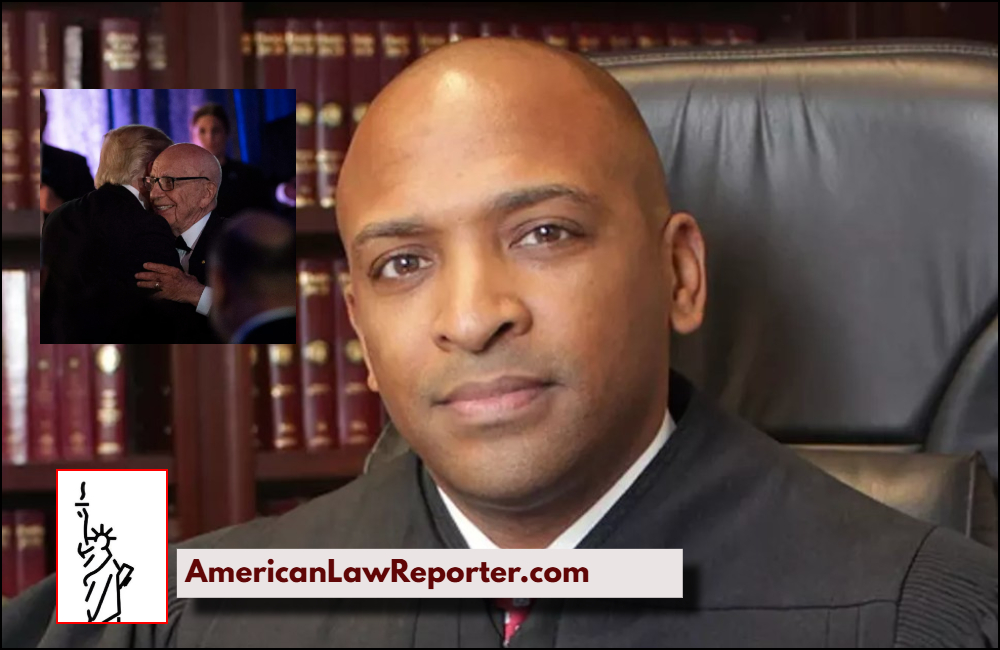A high-profile defamation case filed by President Donald J. Trump against media mogul Rupert Murdoch and The Wall Street Journal has taken a new legal turn as Judge Darrin P. Gayles, the first openly gay Black man appointed to the federal bench, has been assigned to preside over the matter in the Southern District of Florida.
Trump, who is seeking $10 billion in damages, claims the Journal defamed him by publishing a story alleging he sent a sexually explicit birthday card and doodle to the late convicted sex offender Jeffrey Epstein.
Trump has denied ever sending the note and argues the allegations are fabricated and malicious.
Now, under the gavel of Judge Gayles — an Obama appointee confirmed in 2014— the case pits two titans of conservative politics against one another: the former president who once relied on Murdoch’s media empire to bolster his image, and the media magnate whose Wall Street Journal, Fox News, and New York Post helped define right-wing media during Trump’s rise.
The Allegations and the Epstein Connection

Trump’s complaint alleges that Murdoch and The Wall Street Journal ignored his personal warnings not to publish the story. The Journal’s article described the card as including a doodle of a naked woman accompanied by Trump’s signature. In posts on his social media platform Truth Social, Trump called the letter a “fake” and claimed Murdoch had promised him it would not be published.
“The Wall Street Journal, and Murdoch, personally, were warned directly … that the supposed letter they printed by President Trump to Epstein was a FAKE,” Trump wrote.
The Journal has not publicly produced the card in question, and Trump’s legal team insists it does not exist. Despite this, the paper followed up with another report claiming Trump’s name appeared in Justice Department records related to Epstein — a detail that has not been independently verified.
The Legal Maneuvering Begins
Trump’s attorneys are moving aggressively, asking Judge Gayles to compel Murdoch to submit to a deposition within 15 days — citing the media mogul’s advanced age (94) and reported health complications as reasons to secure testimony now.
“Murdoch is 94 years old, has suffered from multiple health issues … and is presumed to live in New York,” Trump’s filing states. The request is unusual, as the case has not yet reached the discovery phase and no pre-trial schedule has been set.
Former News Corp legal executive Joseph Azam criticized the early push for Murdoch’s deposition, calling it a “gratuitous attempt to poke the bear.”
“Trump is using lawfare to silence people,” Azam told NPR. “But he’s going after people who are equally — if not better — equipped to navigate this stuff.”
From Conservative Allies to Legal Adversaries
The case marks a stark turn in Trump’s relationship with Murdoch. Once frequent collaborators on messaging and mutual amplification, their relationship has frayed since the 2020 election.
In 2023, Murdoch’s Fox News paid $787.5 million to settle a defamation suit with Dominion Voting Systems after airing false claims about election fraud. Discovery in that case revealed that Murdoch and his executives privately dismissed Trump’s voter fraud theories, even as their outlets aired them.
Now, Trump appears to view Murdoch as a member of what he often labels the “fake news” media— no longer a reliable ally, but a powerful adversary.
The Role of Judge Darrin Gayles
Appointed by President Obama in 2014, Judge Gayles made history as the first out gay Black man to serve as a federal judge. Before his appointment, he served as a circuit court judge in Miami-Dade and as an assistant U.S. attorney in the Southern District of Florida.
His assignment to this case adds a layer of national attention — not only because of the high-profile parties involved, but also due to his historic appointment and experience in overseeing complex civil litigation.
Potential Precedent and Legal Implications
Legal observers note that Trump has a mixed track record in media defamation cases. While he has secured multi-million-dollar settlements from companies such as X (formerly Twitter), ABC, CBS, and Facebook, his lawsuits against The New York Times, CNN, and The Washington Post have largely been dismissed before trial.
Experts say that if the case moves into discovery, Trump could be subject to deposition and document production related to his relationship with Epstein — a potential legal risk for the former president, who has long sought to distance himself from the disgraced financier.
Moreover, The Wall Street Journal’s legal team is known for its rigorous pre-publication standards. Even under Murdoch’s ownership, the paper published investigative stories — such as its exposés on Theranos, despite Murdoch being a major investor in the company — that reflect its editorial independence from ownership influence.
The Bigger Picture
While some critics label the lawsuit as a political spectacle, its implications are serious: the legal standard for public figures in libel cases is high under New York Times v. Sullivan (1964), requiring a showing of “actual malice.” Trump will need to prove not just that the story was false, but that the defendants knew it was false or acted with reckless disregard for the truth.
If the case proceeds, it could test the boundaries of press freedom, discovery in defamation suits involving public figures, and the power dynamics between political leaders and media titans.

